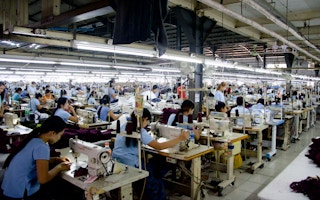Uncertainty looms for the thousands employed in Myanmar’s garment industry which supplies clothes and footwear to some of the world’s biggest brands, including H&M, Zara and Primark.
To continue reading, subscribe to Eco‑Business.
There's something for everyone. We offer a range of subscription plans.
- Access our stories and receive our Insights Weekly newsletter with the free EB Member plan.
- Unlock unlimited access to our content and archive with EB Circle.
- Publish your content with EB Premium.
Myanmar’s military regime, which ousted and detained the country’s leader Aung San Suu Kyi and president Win Myint in a 1 February coup, has killed more than 100 people and detained over 2,000 in a crackdown on daily demonstrations and strikes demanding the military cede control. Garment workers, mostly young women, have been at the helm of the civil movement.
Human rights abuses perpetrated by the military pose a reputational risk to international brands while disruptions to supply chains make doing business untenable, choking a $4.5 billion textile industry that accounts for a third of all exports. Decisions by retailers to pause or cut supply amid on-going political instability will disproportionately hurt women working in a sector that is already reeling from the impact of Covid-19.
Many brands, including Sweden’s H&M, are reluctant to make a call on their long-term plans. A combination of striking workers, dysfunctional rule and greater scrutiny of the industry’s supply chains may be off-putting for some retailers, forcing them to pull-out entirely.
The commercial interests of retailers will be weighed against their obligations to the thousands of garment workers. Persistent political unrest may lead global fashion houses to distance themselves from the ‘Made in Myanmar’ label, already tarnished by a brutal military crackdown against the country’s Rohingya minority in 2017. Maintaining supply chains in Myanmar may become increasingly difficult as tensions wear on. Banks are closed for business making it near-impossible to pay workers’ salaries.
“They have to think about the commercial aspects, and in those circumstances, it is really hard to sustain,” said John Bray, director at global risk consultancy, Control Risks.
Sanctions
Previously Western governments have imposed sanctions, including a prohibition on all imports from Myanmar to the United States, which had a devastating impact on the garment industry.
The US announced sanctions on 10 March on two family members of Myanmar’s commander-in-chief and six of their businesses in a bid to ease the junta’s stranglehold on the country. The latest raft of penalties come on top of restrictions imposed last month. Human rights organisations, including Justice for Myanmar, a non-governmental group that examines the country’s military-backed businesses, have appealed to countries to impose harsher sanctions on conglomerates bankrolling the military.
A United Nations International Fact-Finding Mission on Myanmar presented findings in its 2019 report that several well-known clothing brands were sourcing from factories from inside two industrial zones that were owned by the military. A list of businesses published by Justice for Myanmar does not currently feature any garment-related entities.
Blanket sanctions are unlikely at this stage, said Peter Kucik, a former sanctions advisor at the US Treasury, adding that they are only one aspect of a solution alongside legal and diplomatic pressure.
“The current thinking about sanctions is to be as precise in the targeting as possible,” Kucik told Eco-Business.
“I don’t get the sense that there would be any appetite to impose broad jurisdictional prohibition that would hurt the people of Myanmar as much as, if not more, than the intended targets of the pressure.”
Myanmar’s apparel industry set the country on the path to growth after crippling sanctions were lifted in 2016 at the end of military rule. The sector employs over 700,000 people – most of whom are young women who have migrated from remote native states and regions. Hundreds of factories make clothes for fast-fashion labels looking to take advantage of the comparatively low wages and preferential access to market blocs such as the European Union.
Workers from Myanmar’s garment industry are among a powerful alliance of unions that are taking the lead in mobilising street protests. They are calling for a “full, extended shutdown” of the economy. Women workers have gathered for daily marches brandishing placards pleading for global fashion brands to intervene. Workers have also written a series of public letters to clothing and shoe retailers that have a “significant presence” in Myanmar, asking them to condemn its actions and show support for the workers who make their products.
Intimidation
H&M, the world’s second-largest retailer, which has 45 direct suppliers in Myanmar, said on 8 March that it was shocked by the military’s use of deadly force against protesters, adding that it would pause placing orders in the country. H&M declined to be interviewed.
The fast-fashion retailer’s decision comes on the heels of a statement last month from H&M, Inditex (Zara), Bestseller and Primark that stated that they were, “committed to fully respecting human rights and labour rights in our operations and supply chains, in particular, the right to freedom of peaceful assembly.”
Nevertheless, international brands often rely on second- or third-party suppliers, fogging visibility over working conditions. Forty human and labour rights organisations charged in a 9 March open letter that workers who have shown support or participate in pro-democracy protests are, “being intimated, threatened and, in some cases, laid off by factory management.” The letter goes on to say that workers face discrimination, docked salary and threats of mass dismissals for their participation in pro-democracy protests. “We call on these brands to…comply fully with the brands’ standards for the rights of workers who make their apparel,” the letter states. Letters to retailers were also sent on 15 and 18 February.
If the military remains at the country’s helm and focuses on self-interest, it could spell doom for many industries, analysts say. “The top level [generals] will be making decisions which are based on military logic, not business logic,” says Bray.










